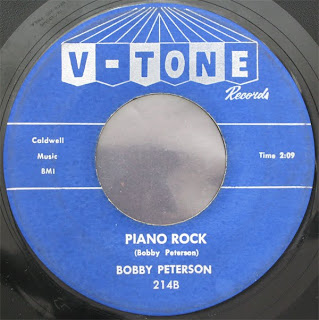Les Cooper - Dig Yourself - Everlast, 1962
Les Cooper (b. Mar. 15, 1931, Norfolk, Virginia) was an American doo wop musician, best known for his hit rock instrumental "Wiggle Wobble".
Cooper sang in several New York doo wop groups, including The Empires and The Whirlers, and was the manager of the group The Charts. In 1962, he signed to Everlast Records and released the single "Dig Yourself" b/w "Wiggle Wobble", billed with his band as Les Cooper & the Soul Rockers. Both sides were produced by Bobby Robinson. The B-side was an instrumental featuring the saxophone playing of Joe Grier (formerly of The Charts himself); it caught on at radio and became a nationwide hit, peaking at #12 R&B in 1962 and #22 on the Billboard Hot 100 early in 1963. It was his only hit; one of the follow-up singles was the sonically similar "Let's Do the Boston Monkey", recorded for Enjoy Records. (thanks Wikipedia!)
All of the tunes mentioned above are available on this CD for those interested: Wiggle Wobble
Everlast Records was a small, New York label that is best known today for the Harlem doo-wop of The Charts. It was run by Bobby and Danny Robinson. Bobby Robinson owned a record shop in New York City. He established many record labels in the '50s and '60s, on some he was the sole owner, on others he was in partnership with his brother Danny Robinson. Among them were Red Robin Records established in 1952 (Bobby and Danny), Whirlin' Disc Records established in 1956 (Bobby), Fury Records established in 1957 (Bobby), Everlast Records established in 1957 (Bobby and Danny), Fire Records established in 1959 (Bobby), and Enjoy Records established in 1962 (Bobby and Danny). Everlast had an initial burst of activity around 1957-1958, then after a hiatus of several years, it then began releasing soul and blues releases around 1963.
And here's the clip:












